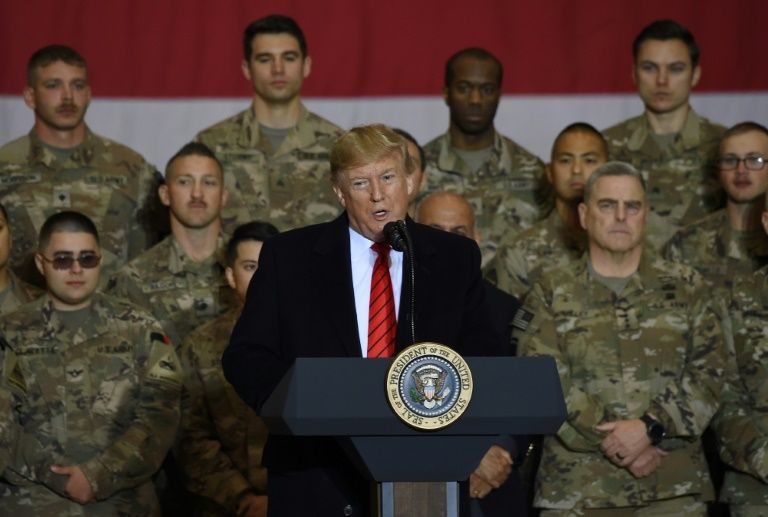ICC must up its game to survive after US onslaught: experts
()
President Donald Trump made a surprise Thanksgiving day visit to US troops in Afghanistan last year . ©AFP/File Olivier Douliery
The International Criminal Court must step up to ensure its survival after US President Donald Trump authorised sanctions against the tribunal over an Afghan war crimes probe, experts said Friday.
Trump’s adminstration on Thursday unleashed an unprecedented onslaught against what it branded a “kangaroo court”, subjecting ICC officials to asset freezes and travel bans if they target US personnel.
The move escalates long-standing US opposition to The Hague-based court, which is battling its own poor track record of convictions, lack of support from the world’s largest powers and internal disputes over pay.
But analysts and rights groups urged the under-fire ICC — set up in 2002 to prosecute the world’s worst crimes — to continue its work with renewed vigour if it wants to cement its legitimacy.
“I believe that the future of the court depends on its willingness to prosecute the ‘hard cases’ involving powerful countries like the United States, Israel, Russia and the United Kingdom,” William Schabas, international criminal law professor at Leiden University, told AFP.
“For too long its work has been directed at developing countries and pariah states. Delivering equal justice for all means that it can tackle the strong as well as the weak.”
– ‘Unprecedented’ measures –
The United States — like Russia, China, Israel, Syria and a number of other countries — is not a member of the ICC, and its opposition to the court is longstanding.
In 2002 the US Congress even passed the so-called “Hague Invasion Act” allowing the US president to authorise military force to free any US personnel held by the ICC — in theory making an invasion of Dutch shores a possibility.
But the Trump administration has now gone further, preemptively targeting the court over any attempt to prosecute US personnel over alleged war crimes in Afghanistan, or its ally Israel over the situation in the Palestinian territories.
US Attorney General Bill Barr said Thursday’s steps were just the first against a “corrupt” institution that he accused, without giving evidence, of being manipulated by Russia.
Personal sanctions by Washington are “unprecedented,” said Carsten Stahn, programme director at Leiden University’s Grotius Centre for International Legal Studies in The Hague.
“They may complicate the investigations and seek to discredit not only individuals but the institution as such. It is thus important that other states speak up clearly to support the independence of the court,” Stahn told AFP.
Rights groups too have called on the ICC’s 123 member states to reaffirm its support for the tribunal, a court of last resort for war crimes and crimes against humanity if countries were unwilling or unable to prosecute suspects themselves.
“It is now upon ICC member states to translate their statements of support into action,” said Amal Nassar, the International Federation for Human Rights’ representative at the ICC.
“This includes full cooperation with the court in its investigations, adequate resources, and a clear signal that ICC staff, their families, human rights defenders and legal professionals can count on their support and protection,” Nassar said.
– ‘Wave of solidarity’ –
But the virulent US opposition against the ICC might have a counter-productive effect, Stahn said.
“Curiously, the US political attacks may backfire in the sense that they may create a new wave of solidarity at a time where the ICC is undergoing internal reform efforts,” he said.
Its governing body, the Assembly of States Parties, in particular “is now asked more than ever to reaffirm the core principles of the ICC,” said Stahn.
Stahn however said he did not believe the sanctions would threaten the court’s existence.
The ICC has started a new set of prosecutions which included the surrender of Ali Kushayb, a Janjaweed militiaman accused of war crimes committed in Sudan’s Darfur region in 2003-2004.
“In some situations, ICC investigations may also serve US interests,” he said.
Jan Hennop and Charlotte van Ouwerkerk
(AFP)
Disclaimer: Validity of the above story is for 7 Days from original date of publishing. Source: AFP.


